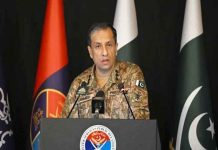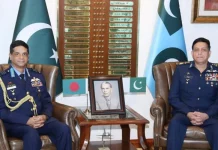By Shakeel Ahmed
ISLAMABAD: Federal Minister for Aviation, Ghulam Sarwar Khan on Wednesday has presented initial investigation report on the Pakistan International Airlines (PIA) plane crash in the National Assembly (NA).
Speaking in the House, the minister blamed plane’s captain, crew members and the Air Traffic Controller (ATC) for the crash, while PIA and the Civil Aviation Authority (CAA) have also been declared responsible because of their inaccuracies in preventing such accidents.
The CCTV footage showed that the ill-fated plane hit the runway after which, the pilot chose to go around (re-take off). Evidence of damages caused to both engines of the plane due to failed landing was also found, he told.
Ghulam Sarwar said that pilot neglected instruction given by ATC and opened landing gears of the plane at 10 nautical miles while they were turned off at 5 nautical miles. Airport administration had told that the aircraft was flying at high altitude at the time of landing. The controller didn’t give any guidance after the plane hit the runway, he went on to say. He told that pilot and co-pilot were not focused and discussing coronavirus throughout their flight time. Action against the responsible people will be taken as per the law, he pledged. The aviation minister said that according to report, the plane was fit for take-off and its landing gears were also working properly. The captain and first officer of the aircraft were well experienced and the weather at that time was also suitable for flying, he stated.
The inquiry report was prepared while keeping in view the investigation record, statements of staff and Airbus team’s report. Data flight recorders, cockpit voice recorders and flight records obtained from air traffic control are also part of the report, he continued.
Meanwhile, Ghulam Sarwar also presented reports on Gilgit crash landing, Air Blue crash and Bhoja Airline incidents, declaring inefficiency of pilots behind these mishaps, however, Chitral plan accident took place due to technical fault. He told the House that action against the pilots holding fake degrees has been launched, adding that 262 pilots out of 860 have not passed their exams by their own while degrees of four were found fake. Aviation Minister Ghulam Sarwar Khan, while speaking in the National Assembly on Wednesday, said that the initial report of the Pakistan International Airlines (PIA) June 22 plane crash found the pilots and air traffic control (ATC) officials to be at fault for not following set procedures. Khan said that both the pilots and the ATC ignored “standard protocols”. The PIA Airbus A320 crashed last month in Karachi’s Model Colony, close to the Jinnah International Airport, killing all but two of the 99 aboard. Flight PK8303 from Lahore came down about a kilometre short of the runway on its second attempt to land.
According to Khan, there was no technical fault in the plane and both the pilots were medically fit to fly. He added that data from the Digital Flight Data Recorder (DFDR) and Cockpit Voice Recorder (CVR) was decoded in the presence of foreign experts.
“According to the report, the plane was 100 per cent fit for flying. It had no technical fault. Flights were suspended due to corona, the plane took its first flight on May 7 and the crash happened on May 22. In between, it completed six flights successfully; five to and from Karachi and one to Sharjah.
“The pilot on the final approach did not identify any technical fault [as well]. At a distance of 10 miles from runway, the plane should have been at an altitude of 2,500 feet but it was around 7,220 feet. This was the first irregularity,” Khan said. He said that the ATC told the pilot thrice that the plane was too high to land but he refused to listen. Another important factor was that the pilot closed the landing gears at a distance of five nautical miles from the runway even though they were open before, he added. Talking about further mistakes, Khan said that the plane was on auto-landing but the pilot brought it back to manual landing before the crash. It should have come in at 40 degrees but it dived at 60 degrees, he added.
The minister also blamed the pilots’ “overconfidence and lack of focus” for the crash. “The pilots were discussing corona throughout the flight. They were not focused. They talked about corona […] their families were affected. When the control tower asked him to decrease the plane’s height, the pilot said ‘I’ll manage’. There was overconfidence.”
The minister, however, added that the control tower was at fault too for not pointing out the damage to the plane after a failed attempt at landing. “[Air traffic controller] should have informed when he saw the engines on fire. The control tower did not inform pilot [so it] was at fault too. When the plane took off again, both engines were damaged.
“He was an extremely experienced pilot. What is sad is that because of the overconfidence and lack of focus of pilot and co-pilot, such a big incident happened. The interim report says cabin crew and control tower were also at fault,” he said, adding that the full report would be released before the end of the year. The minister also spoke about past accidents, the Air Blue crash in 2010, Bojha Airlines crash in 2012, plane crash in Chitral in 2016 and the crash landing of a plane in Gilgit in 2019. He said that Air Blue and Bojha Airlines crash occurred due to “human error and various breaches of flying discipline”. He added that the technical fault in the Chitral incident was “so complicated” that the plane manufacturer itself has not been able to reach a conclusion yet. The minister, however, promised that its inquiry report would be presented in August of this year.
‘Almost 40pc pilots have fake licenses’
The minister said that the government had observed that major airlines in other countries did not have such a history of crashes and therefore, started to investigate pilots. There are 860 active pilots in the country, he said, adding that of these 860, 262 pilots did not even take their exams themselves. Decrying that pilots were not hired on merit, Khan said that fake degrees and licenses were issued. “Almost 40 per cent of pilots have fake licenses,” he said, adding that they did not have flying experience either. He added that the government had started to take action against all such pilots. “In the first phase, 54 such pilots were identified. Show cause notices were issued to 24 and nine others confessed that they were unqualified.
“I believe this issue should not be politicised. It is a matter of national security. The inquiry has been free, fair and transparent,” he concluded.
Shortly after the crash last month, the government had formed a committee, headed by Air Commodore Usman Ghani, who is president of the Aircraft Accident Investigation Board to determine the causes of the crash and issue a report in one month’s time. An 11-member team of Airbus, the manufacturer of the A320 aircraft, had also visited the country and investigated the site of the incident to offer technical assistance to Pakistani investigators in the PK-8303 crash probe.
Earlier this month, the Civil Aviation Authority (CAA) said in a letter to the PIA that the pilot of the crashed aircraft did not follow the instructions of the ATC. The CAA letter said the duty approach controller had raised a non-compliance report in respect of the pilot of PK-8303. It claimed that the pilot was warned twice about his speed and high altitude for approach but he did not follow.




